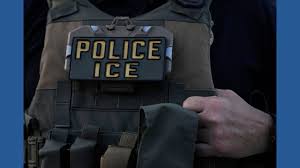A 23-year-old Gresham woman says she was detained for several hours by federal immigration agents after taking photos of what she believed were unmarked U.S. Immigration and Customs Enforcement (ICE) vehicles in a Portland-area parking lot. The woman, a U.S. citizen who asked to remain anonymous for safety reasons, described the experience as “very inhumane” and said she wants to share her story to warn others.
From Taking Photos to Detainment
According to the woman, she was alerted through a Facebook group that ICE agents might be operating nearby. When she saw several unmarked vehicles at a Chick-fil-A in Gresham, she began taking photos of their license plates to share with others online.
Moments later, she said, several agents confronted her. “They followed me, surrounded my car, and blocked me at the next light,” she recounted. “They hit my driver-side window, opened my door, pulled me out, and handcuffed me. They weren’t answering any of my questions.”
Also Read
The woman said she initially feared she was being kidnapped. “I didn’t even know if they were real ICE agents,” she said. “They were laughing like it was a joke. There was no heart in them — it was cold.”
Seven Hours in Detention
The woman said agents transported her to Portland’s ICE facility, where she was restrained and placed in a holding cell for approximately seven hours. “They chained my legs up,” she said. “They wanted to ask me questions and record it, but I refused to answer anything.”
She claimed her requests to call a lawyer were denied, with agents saying that “the landline phones were down.” During her detainment, she was fingerprinted and had her cheek swabbed for DNA testing. After confirming she had no criminal record, she said agents told her she was “lucky for now” and released her — but kept her phone as “evidence.”
“They said they were going to try to get a warrant to go through my phone,” she added. “It’s very inhumane, and I don’t think it’s right … it’s just not right.”
Legal Rights and ACLU Guidance
According to the American Civil Liberties Union (ACLU), citizens and residents have the legal right to photograph or record law enforcement officers, including federal agents, as long as they are in a public space and not interfering with official operations. The ACLU states that officers generally cannot confiscate or search a person’s phone without a warrant.
Civil rights attorneys emphasize that photographing law enforcement vehicles or agents in public is protected under the First Amendment, a principle often reaffirmed in court rulings. However, incidents like this one highlight growing concerns about intimidation and overreach by federal agencies, especially in Oregon, where ICE activity has drawn increasing scrutiny.
ICE Response Pending
News outlet KGW reached out to ICE for a statement regarding the woman’s allegations, but the agency has not yet provided a response. The lack of comment leaves several questions unanswered — including whether the agents involved had proper authorization for the detainment, and why the woman’s phone remains in ICE custody.
Growing Tension in Oregon Communities
This incident comes amid heightened tensions between immigration authorities and Oregon residents following reports of increased ICE presence across the state. Lawmakers and community advocates have warned that federal agents have detained both undocumented immigrants and U.S. citizens during recent operations, sometimes without presenting valid warrants.
State Representative Ricki Ruiz (D-Gresham) recently said that ICE agents in his district detained a U.S. citizen who was photographing unmarked vehicles — a situation that closely mirrors the Gresham woman’s account. Ruiz criticized such actions as violations of constitutional rights, noting that “people are being detained because they look brown or speak Spanish.”
A Call for Accountability
The woman said her experience has left her shaken and distrustful of law enforcement. “I’m scared to even drive now,” she said. “If this can happen to someone who’s a citizen, then it can happen to anyone.”
She hopes her story sparks awareness about individuals’ rights when interacting with law enforcement and the need for greater accountability from federal agencies.
“We live in America. We’re supposed to have rights,” she said. “I just want people to know — don’t be silent, and don’t let them scare you.”












